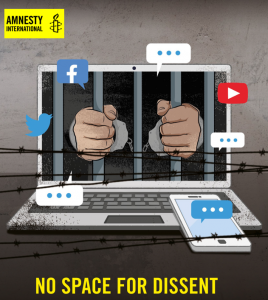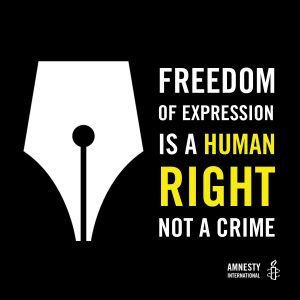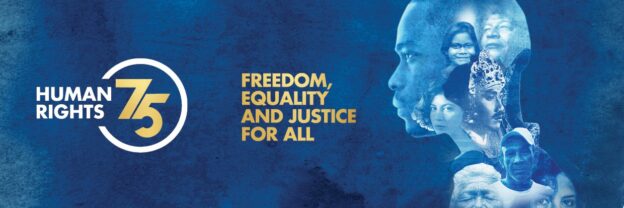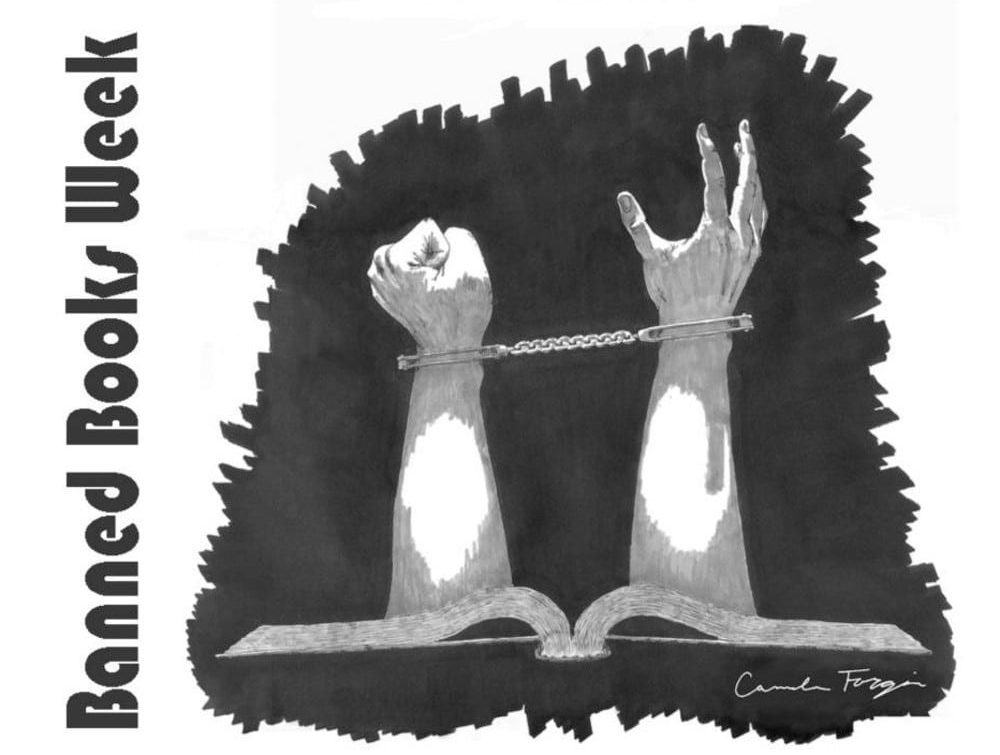This guest blog comes from Ed McKennon, Library Faculty, Glendale Community College, as well as the Amnesty International USA (AIUSA) Working Group for Banned Books. Read more about work between AIUSA and the American Library Association at bottom.
 Each year in late summer I take time to review the cases that Amnesty International has chosen to call attention to during the widely observed Banned Books Week celebrations that take place during the last week of September. I do this, in part, because I am a librarian at a community college where the library works with the Amnesty International student organization to host an annual “Banned Book Reading” in order to draw attention to censorship issues in the United States and around the world.
Each year in late summer I take time to review the cases that Amnesty International has chosen to call attention to during the widely observed Banned Books Week celebrations that take place during the last week of September. I do this, in part, because I am a librarian at a community college where the library works with the Amnesty International student organization to host an annual “Banned Book Reading” in order to draw attention to censorship issues in the United States and around the world.
The slate of cases put forward by Amnesty International in 2021 hail from various corners of the world — Sri Lanka, Nigeria, Russia, Iran, Hong Kong, Central America, and Bangladesh. This year they feature an unpublished fiction writer, a poet, several journalists, and a cartoonist who face an array of sanctions for their work. Some face years in prison, most have already been detained, all encounter some sort of state sponsored intimidation or harassment. Like other years of late, the slate of cases includes those persecuted for their printed publications as well as those facing penalty for what they post online, particularly on social media.
The online environment continues to be an increasingly dangerous place for those who might dissent from the government. To be sure, in countries around the world and here in the United States, authorities are grappling with how to deal with ‘fake news’ and various forms of disinformation as it proliferates on social media. I suspect that is what was on the minds of many lawmakers in Bangladesh as they crafted the “draconian” Digital Securities Act (DSA) and embedded within it overly broad language and extensive pre-trial detention powers.
Unfortunately these provisions — which may seem innocuous at first — are out of step with international human rights standards. They have been used to target or harass those expressing dissenting opinions and have resulted in cases filed against approximately 2000 people and nearly 1000 arrests, often for people posting information on social media that is critical of the government. According to Amnesty International, under the DSA, at least 433 individuals had been imprisoned as of 11 July 2021; at least 185 were held for allegedly publishing offensive and false information online.
Imagine being a 15 year old high school student forced to spend 16 days in a juvenile correction facility because you share a controversial post “to get likes” on Facebook. Mohammad Emon shared such a post in Bangladesh and was arrested and detained in June 2020; formal criminal charges were filed against him in July 2021.
Imagine being a prominent Bangladeshi cartoonist forced to spend 10 months in pre-trial detention for “satirising on Facebook powerful people and the Bangladeshi government’s response to [the] COVID-19 pandemic.” After spending 10 months in detention Ahmed Kabir Kishore faces a 10 year prison sentence as a result of charges including publishing “false information” and “propaganda” which could “deteriorate law and order” by “supporting or organizing crime.” Kishore is still facing charges despite being released on bail in March 2021 one week after fellow accused writer, Mushtaq Ahmed, died in custody. Kishore was presented the Robert Russell Courage in Cartooning Award by Cartoonist Rights International Network in October 2020. Many of his controversial images remain available online.
Pre-trial detention, coupled with laws addressing online speech or terrorism prevention, is one method used by authoritarian governments use to quell expression.
Imagine being a 25 year old poet and teacher who is arrested and detained for more than a year – without being charged with a crime and without access to your family for five months — in connection with a published collection of your poems (Navarasam / நவரசம்) and “other unsubstantiated claims of exposing your students to ‘extremist’ content and ideology.“
Under the Sri Lankan Prevention of Terrorism Act (PTA) it is permissible to hold invividuals without any charges or trial for up to 18 months. According to Amnesty International and several other international and Sri Lankan human rights organizations (see Joint Statement), “the PTA has been used against Sri Lanka’s ethnic and religious minority communities, with a disproportionate number of Tamils and Muslims in detention under the Act.” The same statement notes that one year into his detention, the authorities have yet to bring forth any evidence that substantiates their allegations against Ahnaf Jazeem.
Emom and Kishore are two of 10 cases described in the July 2021 Amnesty International report, No Space for Dissent: Bangladeshi’s Crackdown on Freedom of Expression Online.
You can visit the Amnesty International Banned Books Week website to take action in support of Jazeem and Kishore while registering your support for the repeal or amendment of the Digital Security Act, and calling for the release of those accused or detained solely for peacefully exercising their right to freedom of expression.
HOW CAN LIBRARIES PARTICIPATE?
Libraries can make a difference by organizing community programs and providing information.
By supporting the Banned Books Week initiatives of both the American Library Association and Amnesty International, libraries can reach out to their communities while further advancing the principles of free expression as articulated in the IFLA Statement on Libraries and Intellectual Freedom and elsewhere.
Libraries and bookstores can get in on the action in an organized fashion by reviewing the “Library and Bookstore” section of the online toolkit and exploring ways they can support the effort, connect with the community, and promote freedom of expression.
Augment Book Displays
Ideas in the toolkit include creating a simple “banned books” display that features information about the Amnesty International cases and links to the ‘take action’ webpages amid a display of books that have a history of censorship.
This year the toolkits on the Banned Books Week website feature QR code enabled printable case sheets that provide basic information about each case and facilitate taking action.
Flyers, bookmarks, and the Buying Books, Amplifying Voices book list are also available.
Reach out to Local Amnesty International Groups
Libraries and bookstores can also reach out to local Amnesty International community and college groups to explore ways to partner. Information about how to find a nearby U.S. based Amnesty International group is in the toolkit. International partners may view Amnesty International country contact information via the Amnesty.org website in order to get in touch with their national section.
Add Case Stories, Words, and Images to Virtual or In-Person Readouts
Due to the COVID-19 pandemic many events may still need to be online. However, organizing a virtual read-out with links to online actions would be an exciting local event if a live in-person read-out is not possible. Local authors, librarians, and booksellers could speak about censorship while Amnesty International members or others from the community share stories of the people featured this year, including the words and images of those censored in the event where possible.
Add and Feature Books Written by Authors Imprisoned or Killed for their Writing

While there are many book lists related to censorship available on the web, libraries and bookstores may be particularly interested in the AIUSA Banned Books Week book list, Buying Books, Amplifying Voices which features more than two dozen books written by or about authors who have been harassed, imprisoned, killed, or exiled because of their writing.
Making these books available to the community takes a stand against censorship. By raising awareness of these creators and their ideas, the intent of censorship is thwarted while our communities gain a greater understanding of the world around us. In the words of Russian LGBTI activist/artist and 2020 Banned Books Week case Yulia Tsvetkova, “the government, ironically, did not silence us, but made it possible to loudly declare injustice.”
Register for the live-online kick-off event
Under the theme Page Not Found: Censorship and Human Rights in the 21st Century, this event features the voices of journalists facing criminal charges for what they publish and representatives from the library profession (September 21 at 8pm Eastern Time). Registration & more details are available.
Take action throughout October on these important cases.
The American Library Association (ALA) has been leading Banned Books Week in the United States since the early 1980s to celebrate the freedom to read and call attention to book censorship efforts. During the 1990s Amnesty International USA began to call attention, during Banned Books Week, to “the plight of individuals who are persecuted because of the writings that they produce, circulate or read.” In 2013, ALA honored Amnesty International USA with an Office of Intellectual Freedom award recognizing AIUSA’s approach to Banned Books Week that focuses on the “logical consequences … that follow when governments are allowed to censor” noting that “beyond the removal or burning of books comes the removal and physical harm to authors, journalists and others.”
You may also want to join an event for Banned Books Week with IFLA participation: Page not Found: Censorship and Human Rights in the 21st Century, on 21 September 2021 at 8pm New York time. Censorship in the 21st century involves suppression of books, news, and social media. Around the world, governments are trying to control the internet through cyber-censorship and surveillance, and use sophisticated technology to silence, spy on, harass, and track the critical voices of individuals and journalists. Join us and hear from representatives from Amnesty International USA, the American Library Association’s Office for Intellectual Freedom, the International Federation of Library Associations, and journalists and cartoonists from Central America facing criminal charges for their work.
Register here.

 Each year in late summer I take time to review the cases that Amnesty International has chosen to call attention to during the widely observed
Each year in late summer I take time to review the cases that Amnesty International has chosen to call attention to during the widely observed 
